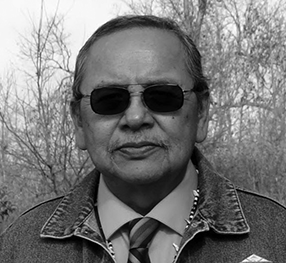For You, a Handful of the Greatest Gift
Small-eyed, plump, and with black
leathery hands, Attaskwa, is composed
and debonair
as it perches on trampled cat tail reeds
beside a quivering, cloud-reflecting pond.
“Filled
with cosmogony, he’s exceedingly
unselfish,” instructs the branch-shaping
sculptor.
“Wabami, Look at him, kekenetama,
he knows. And he’s elated to oversee
what
the daylight brings everyday.”
We focus the camera’s telephoto lens
and see
details of his coat glittering with drops
of luminescent water.
“To our Grandfather, Kemettoemenana,”
narrates the sculpture, “he magnanimously
agreed after
the Last Conflict of the Gods to retrieve
a handful of soil from the deep, singular
ocean that
became land beneath our feet. He
set forth unequivocally a doctrine.
Listen
very closely, my grandchildren,
nottisemetike, for you may not hear
these words
again.” Lifting its black nose
to the sky, Attaskwa ambles
to the pond’s
edge and stops as if to pose
before the picture is snapped.
Behind us,
the sculptor crafts a small
dome-shaped skeletal lodge
and
embeds it to the ground.
We wholly agree that each day
there are overt and minute changes.
Even if we
don’t see or if we’re not there, it happens.
Without Muskrat, our Creation—you
and me,
would be zero. From the alluvial soil
delivered from oceanic depths, we
were made
thereafter. His courage is brazen like
that of a Wetase, Veteran, because he
dove
unflinchingly to retrieve Earth.
Oblivious of our presence, Attaskwa
slides into the pond and swims
to the middle,
creating a cape-like effect of waves
behind him that dissipates
the blue sky
and its clouds. Indicative of his
sacrifice, we learn Attaskwa floated
lifeless
to the surface. In gratitude Earth-maker
resurrected him. So when personal
contributions
are contemplated, ask yourself,
my daughter and son, what did I
sacrifice?
Think specifically of what he did.
Use him, my children, netabenoemetike,
as an example
of what must be done to rectify
society’s misdirection. Only then
will our,
language, religion, culture, and history
thrive in the Muskrat’s benevolent
shadow.
As he approaches the mound
of his home, Attaskwa looks back
at us briefly.
And before his cape of waves reaches
the shoreline, he dives into the dark
green pond.
Before we pack up the equipment,
the sculptor hands us sacred
tobacco
to sprinkle delicately over
the water animal’s architectural
tranquility.
From Manifestation Wolverine. Copyright © 2015 by Ray A. Young Bear. Used with the permission of the author.

